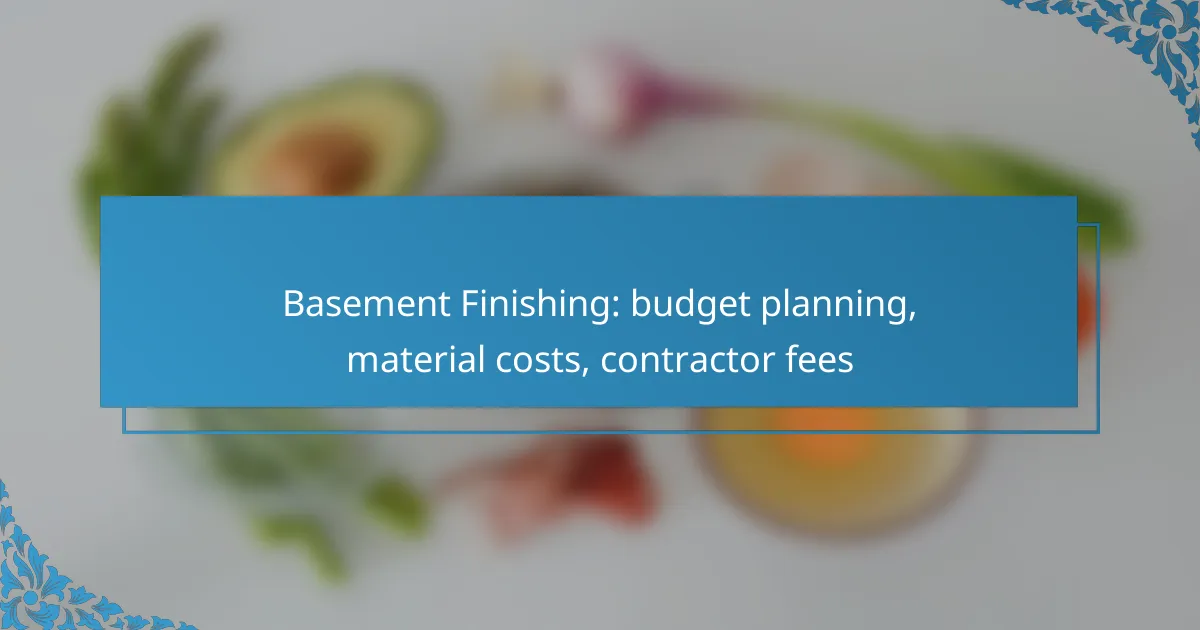Finishing a basement can significantly enhance your home’s value and livability, with costs in Toronto typically ranging from CAD 20,000 to CAD 50,000. To effectively budget for this project, it’s essential to assess your financial limits, desired features, and the costs associated with materials, contractor fees, and permits. Selecting moisture-resistant and durable materials will ensure a functional and appealing space that meets your needs.

What are the costs of finishing a basement in Toronto?
Finishing a basement in Toronto typically costs between CAD 20,000 and CAD 50,000, depending on the scope of the project. Key factors influencing the total cost include material choices, contractor fees, and necessary permits.
Average material costs
The average material costs for finishing a basement in Toronto can range from CAD 10,000 to CAD 25,000. This includes expenses for drywall, flooring, insulation, and fixtures. Higher-end materials, such as hardwood flooring or custom cabinetry, can significantly increase these costs.
When budgeting for materials, consider both quality and durability. Investing in better materials can lead to lower maintenance costs in the long run. It’s advisable to obtain multiple quotes from suppliers to ensure competitive pricing.
Typical contractor fees
Contractor fees for basement finishing in Toronto usually range from CAD 50 to CAD 150 per hour, depending on the contractor’s experience and the complexity of the project. For a complete basement renovation, total labor costs can vary from CAD 10,000 to CAD 30,000.
To manage contractor fees effectively, get detailed estimates that break down labor costs and timelines. Always check references and reviews to ensure you hire a reputable contractor who delivers quality work.
Budgeting for permits
In Toronto, obtaining permits for basement finishing is essential and can cost between CAD 500 and CAD 2,000. The exact fee depends on the scope of the renovation and local regulations. Failing to secure the necessary permits can lead to fines and complications during the sale of the property.
Before starting your project, consult with the city’s building department to understand the specific permits required. Budgeting for these costs upfront can help avoid unexpected expenses later in the process.
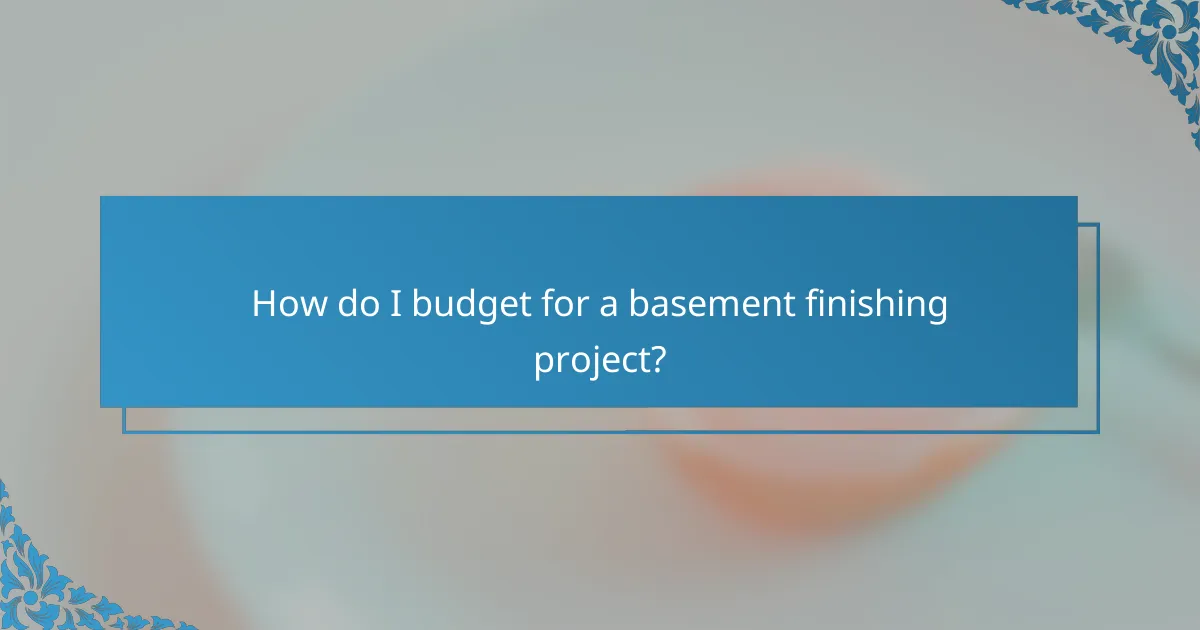
How do I budget for a basement finishing project?
To budget for a basement finishing project, start by determining your overall financial limits and the specific features you want to include. Consider both material and labor costs, as well as any additional expenses like permits or design fees, to create a comprehensive budget.
Creating a detailed budget
Begin your budget by listing all potential expenses associated with the basement finishing project. Common categories include materials, labor, permits, and furnishings. It’s wise to allocate an additional 10-20% for unexpected costs that may arise during the process.
Break down your budget into specific line items, such as flooring, drywall, insulation, and lighting. This approach helps you see where your money is going and allows for adjustments if certain areas exceed your initial estimates.
Estimating labor and material costs
Labor costs for finishing a basement typically range from $30 to $100 per hour, depending on the contractor’s experience and your location. It’s beneficial to obtain multiple quotes from contractors to ensure competitive pricing and to clarify what is included in their estimates.
Material costs can vary widely based on quality and type. For example, basic flooring options may start around $2 per square foot, while high-end finishes can exceed $10 per square foot. Research local suppliers for pricing on materials and consider bulk purchasing to save money.
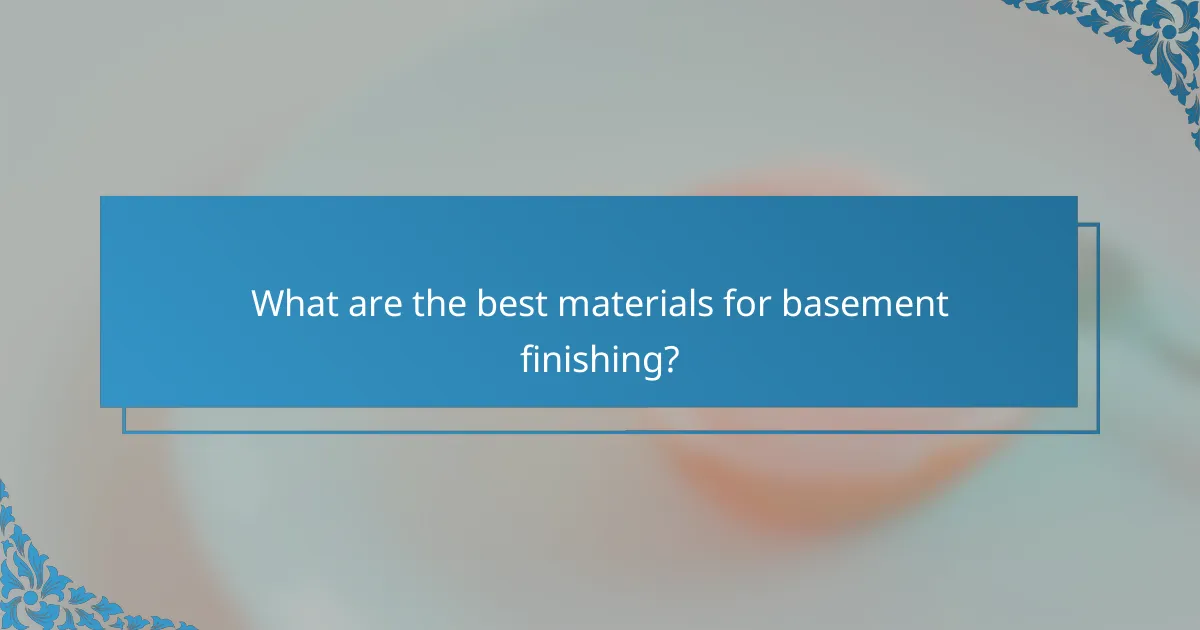
What are the best materials for basement finishing?
The best materials for basement finishing prioritize moisture resistance, durability, and aesthetic appeal. Key considerations include the choice of drywall, flooring, and insulation, each of which plays a crucial role in creating a functional and attractive space.
Drywall options
For basement finishing, moisture-resistant drywall, often referred to as green board or blue board, is essential. This type of drywall is designed to withstand humidity and prevent mold growth, making it suitable for below-grade applications.
Standard drywall can be used in areas with low moisture, but it is advisable to avoid it in spaces prone to dampness. When installing drywall, consider using a vapor barrier to further protect against moisture infiltration.
Flooring choices
When selecting flooring for a finished basement, options like vinyl, tile, and engineered hardwood are popular due to their durability and moisture resistance. Vinyl flooring is particularly favored for its ease of installation and maintenance, while tile provides a robust solution that can handle high humidity.
Carpet can be used in basements but should be avoided in areas that are prone to moisture. If carpet is chosen, ensure it is made from synthetic fibers that resist mold and mildew.
Insulation types
Insulation is crucial for maintaining temperature and preventing moisture issues in a finished basement. Rigid foam board insulation is a common choice, as it provides excellent thermal resistance and moisture control.
Fiberglass batts can also be used, but they must be installed with a vapor barrier to prevent moisture accumulation. Spray foam insulation offers superior air sealing and insulation properties, making it a strong option, albeit at a higher cost.

How do I choose a contractor for basement finishing?
Choosing a contractor for basement finishing involves assessing their qualifications, experience, and reputation. A well-selected contractor can significantly impact the quality and cost of your project.
Evaluating contractor experience
When evaluating contractor experience, look for professionals who specialize in basement finishing and have a proven track record. Ideally, they should have several years of experience and a portfolio showcasing completed projects similar to yours.
Ask potential contractors about their specific experience with local building codes and regulations, as these can vary by region. A knowledgeable contractor will ensure your project meets all necessary standards, which can save you from costly modifications later.
Checking references and reviews
Checking references and reviews is crucial to gauge a contractor’s reliability and quality of work. Request a list of past clients and reach out to them to inquire about their experiences, focusing on communication, timeliness, and the final result.
Additionally, explore online reviews on platforms like Google, Yelp, or local home improvement sites. Look for patterns in feedback, such as consistent praise or recurring complaints, to make a more informed decision.
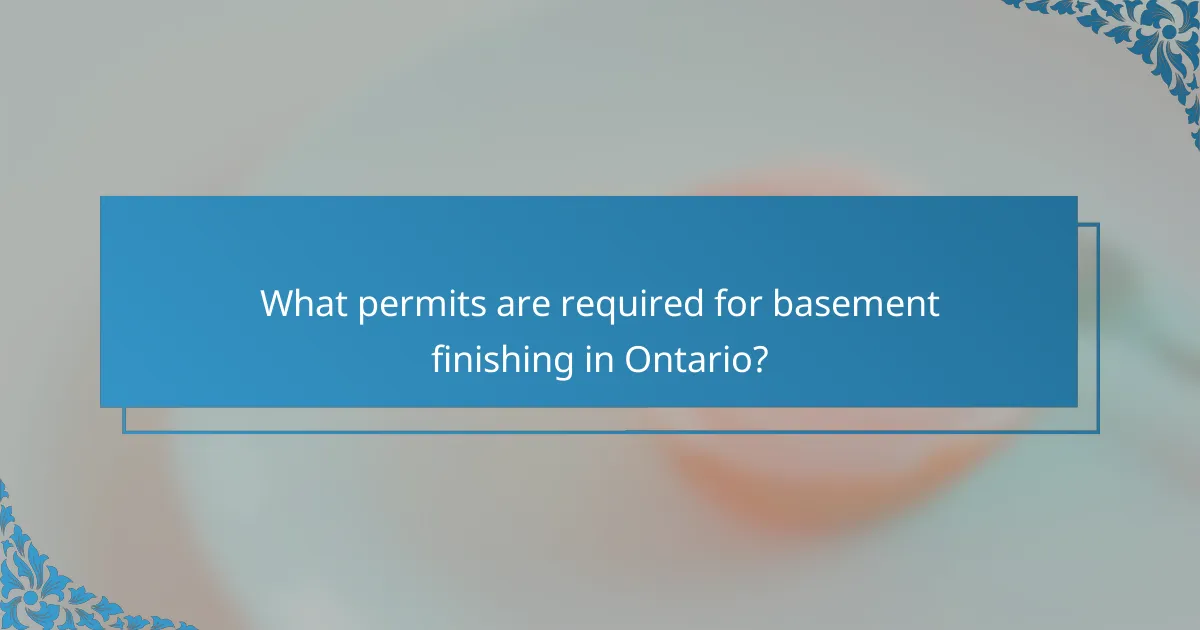
What permits are required for basement finishing in Ontario?
In Ontario, finishing a basement typically requires obtaining several permits to ensure compliance with local building codes and safety regulations. The primary permits include a building permit, as well as electrical and plumbing permits if applicable.
Building permit requirements
To finish a basement in Ontario, you must secure a building permit from your local municipality. This permit ensures that your renovation meets safety standards and adheres to zoning regulations. The application process usually involves submitting detailed plans of your proposed work, which may require the assistance of a qualified designer or architect.
Fees for building permits can vary widely, often ranging from a few hundred to over a thousand Canadian dollars, depending on the scope of the project. It’s advisable to check with your local building department for specific costs and requirements, as they can differ by municipality.
Electrical and plumbing permits
If your basement finishing project includes electrical or plumbing work, you will need to obtain separate permits for these installations. Electrical permits ensure that all wiring and fixtures are installed safely and up to code, while plumbing permits cover any new plumbing systems or modifications.
These permits typically require inspections during and after the work is completed to verify compliance with safety standards. The costs for electrical and plumbing permits can also vary, so it is wise to consult local regulations and possibly hire licensed professionals to handle these aspects of your renovation.

How long does it take to finish a basement?
Finishing a basement typically takes anywhere from a few weeks to several months, depending on the scope of the project and the conditions of the space. A standard renovation can often be completed in about 4 to 8 weeks, but larger or more complex jobs may extend beyond that timeframe.
Typical project timelines
Most basement finishing projects follow a general timeline that includes planning, construction, and final inspections. Initial planning and design can take 1 to 2 weeks, while the actual construction phase usually lasts between 3 to 6 weeks. Final inspections and touch-ups may add an additional week or two.
For example, a simple basement remodel with minimal structural changes may take around 4 weeks, while a more extensive renovation that includes plumbing or electrical work could take closer to 8 weeks or more.
Factors affecting duration
Additionally, the availability and scheduling of contractors can impact the duration. Delays in obtaining permits or inspections can also slow down progress, so it’s wise to factor in some buffer time for these potential setbacks.

What are common mistakes in basement finishing?
Common mistakes in basement finishing include underestimating costs and failing to control moisture effectively. These errors can lead to budget overruns and long-term damage, making it essential to plan carefully.
Underestimating costs
Many homeowners underestimate the total costs associated with finishing a basement. Expenses can quickly add up, including materials, labor, permits, and unexpected repairs. It’s advisable to budget at least 10-20% more than your initial estimate to cover unforeseen expenses.
To avoid this pitfall, create a detailed budget that includes all potential costs. Research material prices and contractor fees in your area, and consider getting multiple quotes to ensure you’re making informed decisions. For instance, labor costs can vary significantly, often ranging from $50 to $150 per hour depending on your location.
Poor moisture control
Failing to address moisture control is a critical mistake that can lead to mold growth and structural damage. Basements are naturally prone to dampness, so it’s vital to implement proper waterproofing measures. This can include using vapor barriers, sump pumps, and dehumidifiers.
Before finishing your basement, assess the moisture levels and take necessary precautions. A moisture test can help determine if additional waterproofing is needed. Regularly check for signs of dampness or leaks, and address any issues promptly to maintain a safe and healthy environment.
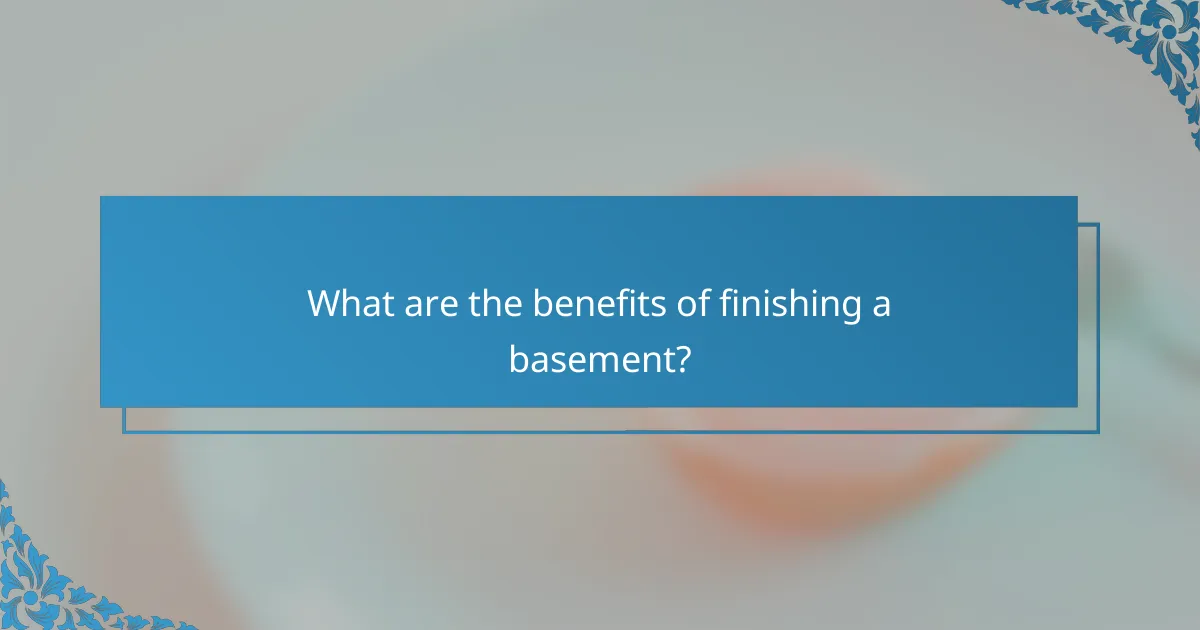
What are the benefits of finishing a basement?
Finishing a basement adds valuable living space to your home, enhancing both functionality and property value. It can transform an underutilized area into a comfortable space for recreation, storage, or guest accommodation.
Budget planning for basement finishing
Effective budget planning is crucial for a successful basement finishing project. Start by determining your overall budget, including costs for materials, labor, and any permits required by local regulations.
Consider breaking down your budget into categories such as framing, drywall, flooring, and fixtures. Allocate around 30-40% for labor costs, as hiring professionals can significantly impact the total expense.
Material costs for basement finishing
Material costs can vary widely based on the quality and type of finishes you choose. Basic materials like drywall and carpet may cost less, while high-end options such as hardwood flooring or custom cabinetry can increase your expenses significantly.
On average, homeowners might spend anywhere from $20 to $50 per square foot on materials alone. It’s wise to shop around and compare prices from different suppliers to find the best deals.
Contractor fees for basement finishing
Contractor fees typically account for a substantial portion of your basement finishing budget. Fees can vary based on the contractor’s experience, the complexity of the project, and your location.
Expect to pay between 15-25% of the total project cost for contractor fees. Always obtain multiple quotes and check references to ensure you hire a reliable professional who fits your budget and project needs.
